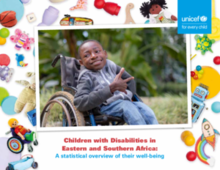Nearly 29 million children with disabilities live in Eastern and Southern Africa. Each of them – like every child in the world – has the right to be nurtured and supported through responsive care and education, to receive adequate nutrition and social protection, and to enjoy play and leisure time. Too often, however, such rights are denied. The reasons vary: They include stigma, lack of accessible services, institutionalization and physical barriers. But the consequences are sadly consistent. When marginalized from society, these children’s chances to survive and thrive are diminished, along with their prospects for a bright future.
Monitoring the inclusion of children with disabilities in development efforts has long been held back by the lack of reliable and comprehensive data. As part of UNICEF’s continued efforts, this report provides regional estimates (drawn from 128 data sources) of children with disabilities in Eastern and Southern Africa. It also includes internationally comparable data from four countries in the region (Lesotho, Madagascar, Malawi and Zimbabwe). The data cover more than 10 indicators of child well-being across all sectors − from nutrition, health and education to protection from violence and discrimination.
The findings expose a stark reality: Children with disabilities are still being left behind despite the aspirations laid out in the 2030 Agenda for Sustainable Development. These children are deprived of their rights, feel discriminated against and often lack hope for the future. Societies are clearly not doing enough to realize the most basic human rights of all children. As a result, the vicious cycle of exclusion and disadvantage continues.
The report aims to promote the use of these data to make children with disabilities in the region more visible, bringing about a fuller understanding of their life experiences. It offers evidence crucial to decision-making to fulfill obligations, both moral and legal, to give every child an equal chance in life.

